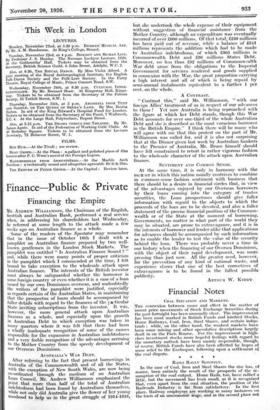Finance Public & Private
Financing the Empire Ma. ANDREW- WILLIAMSON, the Chairman of the Engilsh, Scottish and Australian Bank, performed a real service when, in addressing his shareholders last -Wednesday, he referred at some length to the attack made a few weeks ago on Australian finance as a whole. Some- of the readers of the Spectator may remember that in the issue of October 16th I dealt with a pamphlet on Australian finanee prepared by two well- known gentlemen in the London Stock Markets. The pamphlet was entitled " Is Australian Finance Sound ? " and, while there were many points of proper criticism in the pamphlet which I commended at the time, I felt bound to take exception to the wholesale attack upon Australian finance. The interests of the British investor must always be safeguarded whether the borrower is some foreign country or even whether it is a case of a loan issued by our own Dominions overseas, and undoubtedly the writers' of the pamphlet were justified, especially as regards certain of the Australian States, in maintaining that the prospectus of loans should be accompanied by fuller details with regard to the finances of the ra7ticular State inviting subscriptions from the investor. It was, however, the more general attack upon Australian finances as a whole, and especially upon the growth in Australian Debt to which exception was taken in many quarters where it was felt 'that there had been a wholly inadequate recognition of some of the causes responsible for the expansion in Australian indebtedness and a very feeble recognition of the advantages accruing to the Mother Country from the speedy development of our Overseas Dominions.
AUSTRALIA'S WAR DEBT.
After referring to the fact that present borrowings in Australia of the Commonwealth and of all the States, With the exception of- New South Wales, are now being Co-ordinated through the medium of an Australian Loan Council, Mr. Andrew Williamson emphasized the Point that more than half of the total of Australian indebtedness had been found by Australians themselves, While not only did Australia give the flower of her young manhood to help us in the great struggle of 1914-1918, but she undertook- the whole• expense of their equipment without.. suggestion . of financial assistance - from . the Mother Country, although ab:expenditure was eventually incurred ofovir.£600 millions. Of that latal-;-£250 millions has been paid out of revenue, while a. balance of £841 Millions represents • the addition which had to be made to Australian indebtedness, of which £805 millions is Commonwealth Debt and £86 millions States Debt. Moreover, .no less than £92 millions of 'Commonwealth War debt arose from the obligations to the Imperial Government for services rendered and goods supplied in connexion with and War, the great proportion carrying a high interest and all of which is. being repaid by semi-annual -instalments equivalent to a further 1 per cent. on the whole.
A CONTRAST.
" Contrast this," said Mr. Williamson, " with our foreign Allies' treatment of us in respect of our advances to them ! Yet now Abstralia is being reproached with the figure at which her Debt stands, though this War Debt accounts for over one-third of the whole Australian Debt and she is described as the most voracious borrower in the British Empire." I think there will be many who will agree with me that this protest on the part of Mr. Williamson was called for, and it is also not surprising that at the Dinner given last week by Australian bankers to the Premier of Australia, Mr. Bruce himself should have felt constrained to retort in rather vigorous fashion to the wholesale character of the attack upon Australian finance.
SENTIMENT AND COMMON SENSE.
At the same time, it is only in harmony with the mrmer in which this nation usually 'contrives to combine in common-sense fashion sentiment with business that there should be .a desire in financial- circles that, in view of the advantages enjoyed by our Overseas borrowers by their loans coming into the category of trustee securities, the Loan prospectuses should give fuller information with regard to the objects to which the proceeds of the loan are to be devoted, and also a fuller statement of the precise financial position of the Common- wealth or of the State at the moment of borrowing. Governments, no matter in what part of the world they may be situated, are prone to extravagance, and it is in the interests of borrower and lender alike that applications for advances should be accompanied by such information as to enable the lender to test the value of the security behind the loan. There was probably never a time in our history when the financing of our Oversee Dominion'S, with the object of their rapid development, was more pressing than just now. All the greater need, however, for the prevention of any kind of national waste, and experience shows that one of the best correctives of extravagance is to be found in the fullest possible publicity.
ARTHUR W. KIDDY+






























































 Previous page
Previous page